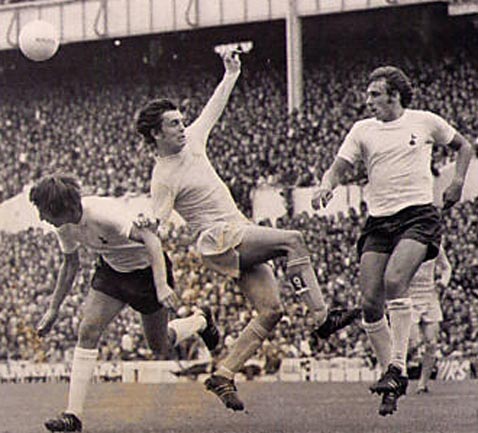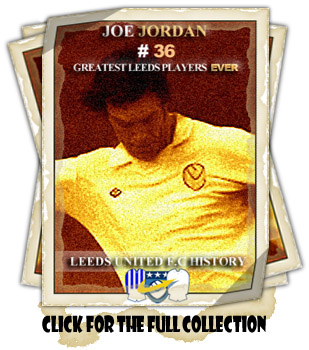

Jordan: Joseph (Joe)
1970-1978
(Player Details)
Centre Forward
Born: Carluke, Lanarkshire: 15-12-1951
Debut: v Vitoria Setubal (h) (substitute): 10-03-1971
5’11 1/4” 11st 3lb (1973)
#36 in 100 Greatest LUFC Players Ever

Born in Carluke but brought up in Cleland, Jordan worked in an Architect’s office and
despite interest from Celtic and Leicester City, he played for junior side Blantyre Victoria
before being picked up by Morton in October 1968. He played only a handful of games for the
Greenock club, mostly at Centre-Forward but some at Centre-Half. He scored twice in twelve
games in total, one goal in seven starts and three substitute appearances coming in the
League, before he was recommended to Leeds by old favourite, Bobby Collins. He was signed by
Leeds as an eighteen year old for a bargain £15,000 in October 1970, with a further bonus of
£5,000, if he played twenty games for Leeds. Initially, there was little prospect of Jordan
getting first team football, as the partnership of Allan Clarke and Mick Jones was a well
established and successful duo. His debut came in March 1971 as a sixty-ninth minute
substitute for Mick Jones in an Inter Cities Fairs Cup Tie against Vitoria Setubal at Elland
Road. He scored his first goal for Leeds in the Inter Cities Fairs Cup match to decide the
final destination of the Trophy, but it did not stop Leeds going down to Barcelona at the
Nou Camp on 22nd September 1971. Jordan endured long spells as substitute but United
transformed him into an unselfish inspirational leader. Joe “Jaws” Jordan’s toothless grin
became a regular feature of the League circuit, usually after the muscular Scot had buried
the ball in the back of the net. He proved an excellent successor to Mick Jones as focal
point of the Leeds attack, where his aggression and energy made him a constant threat. In
1973, he appeared in the first team on a regular basis, managing sixteen League starts and
scoring nine goals. However, he was left out of the team which contested the FA Cup final
against Sunderland which Leeds lost 1–0. Days later, Don Revie selected him for the
European Cup-Winners’ Cup Final on 16th May 1973 against AC Milan, which again ended in a
1–0 defeat. Just three days later he made his Scottish debut against England at Wembley as
a substitute for Lou Macari as England won 1-0. Jordan was a Leeds regular in the following
season, as they coasted to the League title. He scored seven goals in twenty-five League
games and earned eight more Scotland caps by the end of the season. He claimed his first
goal for Scotland in the vital World Cup Qualifier with their second and winning goal in a
2-1 win over Czechoslovakia at Hampden Park on 26th September 1973. His others came as he
came on as a substitute against Switzerland in Berne on 22nd June 1973, which was followed
by his run-on debut against Brazil at Hampden Park eight days later. On 17th October 1973
he played in the return leg in the World Cup Qualifiers against Czechoslovakia in Bratislava
and there was a sixth cap gained in a friendly as a substitute against West Germany on 14th
November 1973 at Hampden. In May 1974 he played in all three Home Championship fixtures at
Hampden Park, on 11th May as a substitute in a 0-1 loss to Northern Ireland, three days
later in a 2-0 win over Wales and four days after that he scored his second goal for
Scotland as England were beaten 2-0. There were two friendly games, a loss to Belgium in
Bruges on 1st June 1974 and his third goal arrived in a 2-1 win against Norway in Oslo five
days later before three World Cup Final games which saw Scotland eliminated without losing
a game. Jordan scored the second goal in a 2–0 win over Zaire in the first group game, on
14th June 1974 in Dortmund, then after a 0-0 draw with Brazil in Frankfurt four days later,
he scored a last minute equaliser in a 1–1 draw with Yugoslavia on, four days later at the
same venue. Although Scotland finished the group unbeaten, they went out of the competition
at the group stage on goal difference. At Leeds, Mick Jones was fighting a losing battle
with a knee injury, and in the 1974–75 season Jordan was finally able to establish himself
as the club's main target man. He was in the Leeds team which contested the 1975 European
Cup, which Leeds lost 2–0 to Bayern Munich. The match signalled the end of Revie's side.
The older players began to leave the club, and Jordan found himself at a club in slow
decline. Jordan won his only Scotland Under-Twenty-Three cap on 24th March 1975 in a 2-0
win over Holland in a European Championship Qualifier at Easter Road, Edinburgh. However,
he was still a regular for Scotland, and in 1977 he caused controversy during the decisive
World Cup qualifying match between Scotland and Wales. Late in the game, with the scores
level, Scotland were attacking in the Wales penalty area when Jordan allegedly handled the
ball. The referee, believing the ball to have been handled by a Welsh player, awarded a
penalty, from which Scotland scored. The victory meant that Scotland qualified for the
World Cup at Wales' expense. He was selected by Ally McLeod in the Scotland squad for the
1978 World Cup in Argentina, scoring in the opening 3–1 defeat against Peru. Scotland
again failed to qualify beyond the group stage. Jordan had notched his sixth international
goal in a European Qualifier against Spain in Valencia on 5th February 1975 and this had
been followed by the opening goal in Scotland's 3-1 win against Czechoslovakia at Hampden
Park in a UEFA European Cup Qualifier. That was to be his last international goal while at
Leeds but his first while at Manchester United soon followed with the goal against Peru at
Cordoba on 3rd June 1978 made his tally eight. Jordan, who won twenty-seven of his
fifty-two full caps for Scotland and one at Under-Twenty-three level, while at Elland Road,
won a League Championship medal with Leeds before going to Manchester United for a then
record fee of £350,000 in January 1978, where he scored thirty-seven goals in one hundred
and nine League starts, he also scored twice in eleven starts amnd one game from the bench
in the F.A. Cup, twice in four starts in the League Cup and started one game in the UEFA
Cup without scoring. Jordan helped Manchester United reach the FA Cup final in 1979, which
they lost 3–2 to Arsenal. There was just one more goal for Scotland while he was at Old
Trafford.It was the opening Scottish goal in a 4-0 win at the Ullevaal Stadium, Oslo
against Norway in a European Championship Qualifier on 7th June 1979. In July 1981 a
£325,000 took him to AC Milan. His first goal for his country while at Milan was the opener
in a 2-0 win over Sweden at Hampden Park on 9th September 1981 in a World Cup Qualifier.
In 1982, Jordan was again in the Scotland squad for the World Cup. Scotland once again fail
to progress beyond the group stages. However, a personal milestone was achieved when he
opened the scoring in the 2–2 draw against the USSR at the Estadio La Rosaleda, Malaga on
22nd June 1982, when he set the record of having played and scored in three World Cup
Final Stages. Unfortunately he was injured in the same match, missed the rest of the
tournament and never played for his country again. It was his eleventh International goal
in his fifty-second International. As a player with more than fifty caps, he holds a
permanent place in the Scotland Hall of Fame. While with AC Milan, in 1981-82 he scored
twice in twenty-two games as they were relegated from Serie A, due to bribery and match
fixing, but did finish third bottom, and the following season in Serie B he netted ten in
thirty games Which was critical in the club's promotion back to Serie A. He was a firm
favourite with the fans at the San Siro. He joined Hellas Verona and played the 1983-84
season there. It was injury riddled and his Serie A appearances were restricted to only
twelve and he managed just one goal. He did, however help the club reach the Copa Italia
Final only for them to be beaten by Roma in a two-legged final. The clubs drew 1-1 in the
first Leg but Roma scored the game's only goal in the final minute of the Second Leg. Jordan
had scored in one of the Semi-Final Legs. It was his only goal in nine starts in the Cup and
he also played three games in the play-offs. He signed for Southampton for £150,000 in August
1984, where he scored twelve goals in forty-eight League starts. He also scored twice in the
F.A. Cup and three times in the League Cup. In the summer of 1986 he joined Bristol City and
helped them to the 1987 Freight/Rover Trophy Final. As a player he scored eight goals and
made thirty-eight starts and nineteen games from the bench in the League at Ashton Gate. He
became Terry Cooper’s Assistant Manager at Bristol and was appointed caretaker Manager, when
Cooper was dismissed in March 1988. He then took over on a permanent basis as Player-Manager,
steering them to the 1988-89 Littlewoods Cup semi-final. The following season he led City to
promotion from the Third Division with a side containing ex-Leeds players Ronnie Sinclair,
Bob Taylor, David Rennie and Mark Gavin. He acted as Scotland’s public relations officer in
the 1990 World Cup in Italy. In September 1990 he was appointed Manager of Hearts, who were
runners-up to Rangers in 1991-92, but unable to capitalize on that platform, he had a
spell as assistant manager at Celtic, in June 1993, before going to Stoke City as Manager
in November 1993, but endured a torrid time there and twelve months later was named as
Bristol City’s boss again, leaving in March 1997. He assisted Lou Macari in coaching
activities at Huddersfield Town from December 2000 to May 2002. Jordan was part of Harry
Redknapp's backroom team at Portsmouth and continued to coach the team under the
management of Velimir Zajec and Alain Perrin. He took over as caretaker manager for two
games in November 2005 after Perrin's departure, before Harry Redknapp returned. Jordan
left Portsmouth on 7th November 2008, when Harry Redknapp left to become Manager of
Tottenham Hotspur. On 8th November 2008, Jordan joined Redknapp as first team coach at
White Hart Lane. His two sons, Andrew and Thomas, both became professional footballers.
Andrew played with Bristol City Cardiff City and Hartlepools United but had to retire
because of injuries. Thomas started as a Junior with Bristol City then had one game with
Southend United before joining Non-League Tamworth and after that was loaned to Forest
Green Rovers and after playing close to one hundred and fitty times for Havant and
Waterloo he is approaching the same mark with Eastleigh. He was capped four times by
Scotland at Under-Twenty-One level.